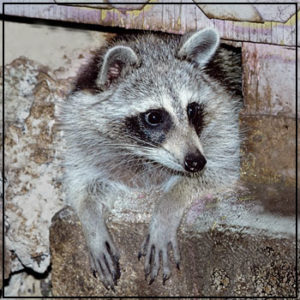
If raccoons have invaded your house, it’s important that you undergo raccoon waste removal. Not only do these pesky critters cause property destruction, which can lead to fires, floods, or contaminated food, but their waste is also very dangerous. Raccoon feces and urine can spread diseases in your home.
Raccoon waste looks like dog waste, so it’s easy to miss it at first. The odor from raccoon feces is stronger and it usually displays undigested particles of what they have eaten. Furthermore, raccoons typically use communal areas–called raccoon latrines–that can be either inside or outside. You may find raccoon latrines at the base of a tree, a deck, a porch, an attic, or a garage.
Consider the following raccoon feces dangers as you attempt raccoon waste removal.
Why Raccoon Feces is Dangerous
Raccoon feces carry several parasites and diseases, which can be dangerous to your family’s health.
- Roundworm: Also known as Baylisascaris Procyonis, this parasite is harmful to both humans and to dogs. Roundworm is typically contracted through secondary consumption. If it goes untreated, roundworms can progress through the body to the brain, where it causes significant damage or death. Unfortunately, it’s easy to pick up ringworm eggs via raccoon waste, so it’s recommended that you seek treatment right away, should you come in contact with raccoon feces.
- Giardia: Present in raccoon feces, this disease can spread to any surface in contact with a raccoon’s waste and even your home’s drinking water. Symptoms typically include nausea, abdominal cramps, dehydration, and diarrhea.
- Salmonella: Being exposed to these bacteria can lead to diarrhea, fever, and abdominal pain, but be careful because its effects don’t appear right away. If you don’t try to get rid of salmonella, the bacteria may lay dormant for quite some time and may return in the right conditions.
- Leptospirosis: Carried through raccoon urine, this disease can get into your home’s drinking water and cause a combination of fever, vomiting, diarrhea, general pain, headaches, bleeding of the lungs, and kidney failure.
Finally, while raccoons are known carriers of rabies, their feces won’t spread the disease. Transmission happens through contact with their saliva, such as a bite or even a scratch.
How Long Raccoon Feces is Dangerous
It can take up to 2-4 weeks for raccoon feces to become infectious and dangerous. According to the Centers for Disease Control and Prevention, young people and individuals with developmental disabilities have the highest risk of infection because they are more likely to touch contaminated soil and put their fingers in their mouths.
How to Safely Remove Raccoon Waste
If you have found a latrine, please follow the following steps for raccoon waste removal.
- Consider cleaning the area to reduce infection risks. Remember: eggs deposited in raccoon feces take anywhere from two to four weeks to transmit an infection.
- Avoid contaminating your hands and clothing by wearing disposable gloves, rubber boots and a respirator when you remove raccoon waste.
- Dispose of any waste, so that it doesn’t enter your household, contaminate other materials or result in accidental ingestion.
Common FAQs About Racoon Feces Removal
What specific cleaning solutions or disinfectants are recommended for safely cleaning areas contaminated by raccoon feces?
For cleaning areas contaminated by raccoon feces, it’s recommended to use a solution of bleach and water, as bleach is effective in killing parasites and disinfecting the area. The CDC suggests a 10% bleach solution (one part bleach to nine parts water). It’s important to wear gloves and a mask during the cleaning process to avoid direct contact with harmful pathogens.
Can raccoon feces and urine cause long-term damage to building structures, and if so, how can this be prevented or remediated?
Concerning the impact on building structures, raccoon feces and urine can indeed cause long-term damage. The acidity of the urine and the moisture in feces can degrade building materials over time. To prevent this, it’s crucial to promptly remove the waste and disinfect the area. Regular inspection and maintenance of areas prone to raccoon infestation can also mitigate this risk.
Are there specific signs or symptoms in humans or pets that indicate exposure to parasites or diseases from raccoon feces?
Regarding signs or symptoms of exposure to diseases from raccoon feces, humans and pets might exhibit various symptoms depending on the specific pathogen. For example, exposure to roundworms can lead to organ damage or nervous system disorders, while Salmonella can cause gastrointestinal issues. If exposure is suspected, it’s important to seek medical or veterinary assistance immediately for appropriate diagnosis and treatment.
Rather than continue to endanger your health, work with Eliminate ‘Em to get the infestation under control and remove the remaining raccoon waste. To make an appointment, give us a call today.


